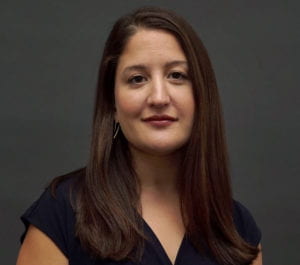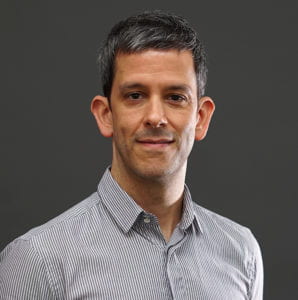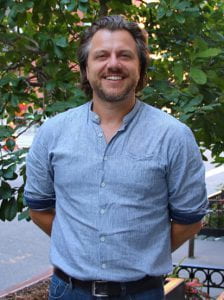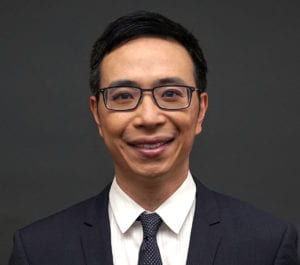Emily Goldmann
Assistant Professor of Epidemiology
 Emily Goldmann is a Clinical Assistant Professor in the Department of Epidemiology at the School of Global Public Health. She holds a BA in Economics (honors) from Columbia University and an MPH and PhD in Epidemiology from the University of Michigan.
Emily Goldmann is a Clinical Assistant Professor in the Department of Epidemiology at the School of Global Public Health. She holds a BA in Economics (honors) from Columbia University and an MPH and PhD in Epidemiology from the University of Michigan.
Trained as a psychiatric and social epidemiologist, Dr. Goldmann’s research centers on the social determinants of mental illness and suicidal behavior. Her recent work has examined comorbidity between mental and physical illness and the role of social context in comorbidity. A recent StrokeNet fellow, Dr. Goldmann is also currently exploring factors associated with depression symptom trajectories following stroke and the impact of low-intensity interventions to prevent and reduce symptoms of depression and anxiety among stroke survivors using mobile technologies. Previous work has centered on the role of neighborhoods, socioeconomic status and social support in posttraumatic stress disorder in urban areas, as well as the mental health consequences of disasters and other potentially traumatic events.
Brian Hall
Professor of Global Public Health, NYU Shanghai

Brian Hall is a Full Professor of Global Public Health at NYU Shanghai and an Associated Professor at the School of Global Public Health, NYU. Since 2014, Hall has been an Associate faculty member in the Department of Health, Behavior and Society at the Johns Hopkins Bloomberg School of Public Health (JHBSPH).
Prof. Hall’s research is broadly focused on the application of qualitative and quantitative approaches to address diverse population health challenges. Hall has served as a consultant for the World Health Organization, UNICEF, UNAIDS, and collaborated with several community-based organizations to improve the health of various populations, including internal Chinese and transnational migrants, adolescents, caregivers, and older adults. He is currently working on culturally adapting and trialing scalable digital mental health interventions with the World Health Organization for Chinese adults and Filipino migrant workers. Hall led the first large-scale mixed-methods study of transnational Filipino and Indonesian domestic workers, which examined the social determinants of various health outcomes, including sexual health, cardiometabolic, social, and mental health domains. Hall is currently collaborating with the WHO on the regional framework for mental health in the Western Pacific Region, serving as a Commissioner on the Lancet Commission for Mental Health in China, and working on the Diagnostic and Statistical Manual of Mental Disorders Working group on Culture, which is developing and updating the cultural material for the DSM-5-TR.
Prof. Hall specialized in epidemiological methods and public health during a two-year NIMH T32 Fellowship in Psychiatric Epidemiology in the Department of Mental Health at the JHBSPH. In 2013 he moved full-time to China through a Fogarty Global Health Fellowship (UMJT Consortium), hosted by the University of North Carolina Institute of Global Health and Infectious Disease, JHBSPH, and the Sun Yat-sen University School of Public Health. In 2017 Hall was the inaugural Global Mental Health Fellow of the World Health Organization, and in 2019 he was elected as a Fellow of the American Psychological Association (D52: International & D12: Clinical). That same year Hall was the recipient of a Presidential Fellowship for Foreign Talents from the Chinese Academy of Sciences in Beijing. Hall’s dedication to global health mentoring was recognized by a Faculty Excellence in Advising Award, Center for Global Health, at the JHBSPH, also in 2019. Hall has co-authored more than 200 journal articles and received seven early career awards, including the Chaim and Bela Danieli Young Professional Award, International Society for Traumatic Stress Studies, and the American Psychological Association Award for Distinguished Contributions to Psychology in the Public Interest.
Follow this link to the NYU Shanghai Global and Community Mental Health Research group website: www.um-gmh.com
Healthright

Health Right International mobilizes the health sector to promote and protect these and other basic human rights and civil liberties for all people, in the United States and abroad. In collaboration with a network of affiliates around the world and in partnership with local communities, we work where health is diminished or endangered by violations of human rights and civil liberties.
PhuongThao D. Le
Phuon gThao D. Le, PhD, MPH is an Assistant Research Scientist at NYU School of Public Health, and the Technical Lead for Monitor, Evaluation, Accountability, Research, and Learning at HealthRight International.
gThao D. Le, PhD, MPH is an Assistant Research Scientist at NYU School of Public Health, and the Technical Lead for Monitor, Evaluation, Accountability, Research, and Learning at HealthRight International.
PhuongThao D. Le, PhD, MPH is interested in improving the health of marginalized populations globally, particularly in using implementation science, mixed methods research, program monitoring and evaluation to advance anti-human trafficking efforts, global mental health, and psycho-oncology. Dr. Le was most recently a Postdoctoral Fellow in the Department of Mental Health at Johns Hopkins Bloomberg University School of Public Health (2017-2020). Prior to that, she was Postdoctoral/Faculty Fellow at NYU School of Public Health (2014-2017).
Dr. Le conducted the first known mixed-methods research study to examine the psychosocial issues among survivors of human trafficking (Le, 2014 Lancet Global Health; Le, 2016) and has published several peer-reviewed papers on the global public health implications of commercial sexual exploitation and trafficking (Le et al., 2017; Le et al., 2018; Le & Halkitis, 2018). She has also led the qualitative analysis and development of mental health interventions in low-resource settings in Latin America (Agrest and Le et al., 2018), Asia (Le & Taylor, 2018) and in low- and middle-income countries (Le et al., in progress; Le et al., systematic review in progress).
Dr. Le is currently a co-I on the BeFITS-MH study (R01MH122851, mPIs Yang and Bass), which seeks to validate a pragmatic measure to assess the barriers and facilitators to the implementation of task-sharing mental health interventions; the proposed measure will be validated across three ongoing research studies, in S. Africa, Chile, and Nepal. As part of HealthRight International, she serves as co-PI on a developmental evaluation project to generate evidence and learnings for community-based models to improve health services in the nomadic and semi-nomadic populations in Kenya; and along with Dr. Wietse Tol (University of Copenhagen, HealthRight International) she is leading a team on a project to conduct a consensus-based priority setting study for mental health and psychosocial support in humanitarian settings (funded by Elrha’s R2HC Programme and conducted under the auspices of the Inter-Agency Standing Committee Reference Group on Mental Health and Psychosocial Support in Emergencies). Dr. Le is also developing a research portfolio in global psycho-oncology to strengthen the provision of cancer supportive services in low-resource settings.
Supriya Misra
Assistant Professor/Faculty Fellow in the Department of Social and Behavioral Sciences at the NYU School of Global Public Health
 Supriya ‘s research focuses on how the ways in which society treat people influence their health, focusing on mental health inequities for individuals with socially marginalized identities (e.g., by ethnicity, gender) and for socially stigmatized illnesses (e.g., HIV, psychosis). In particular, she focuses on the roles of discrimination, stigma, and trauma on the onset and experience of mental illnesses in both global and local settings. She uses epidemiological methods and qualitative approaches for a combined understanding of population-level patterns across communities and lived experiences
Supriya ‘s research focuses on how the ways in which society treat people influence their health, focusing on mental health inequities for individuals with socially marginalized identities (e.g., by ethnicity, gender) and for socially stigmatized illnesses (e.g., HIV, psychosis). In particular, she focuses on the roles of discrimination, stigma, and trauma on the onset and experience of mental illnesses in both global and local settings. She uses epidemiological methods and qualitative approaches for a combined understanding of population-level patterns across communities and lived experiences
within communities. Previously, she worked for several years in nonprofit management developing and implementing evidence-based health education and health technology tools to promote behavior change. She has also co-authored three textbooks on best practices in behavioral health. She earned her ScD in Social and Behavioral Sciences from the Harvard T.H. Chan School of Public Health, and her MA and BA in Psychology from Stanford University.
Peter Navario
Clinical Associate Professor of Public Health Policy and Management & Executive Director, HealthRight International
 Peter Navario is the Executive Director of HealthRight International, a global health NGO dedicated to empowering marginalized communities to live healthy lives. Peter is also the Director of Global Health Strategy and Clinical Associate Professor of Public Health Policy and Management at NYU’s School of Global Public Health.
Peter Navario is the Executive Director of HealthRight International, a global health NGO dedicated to empowering marginalized communities to live healthy lives. Peter is also the Director of Global Health Strategy and Clinical Associate Professor of Public Health Policy and Management at NYU’s School of Global Public Health.
Current areas of interest include the cost-effectiveness of community-based health interventions, global health financing, global mental health, and HIV risk among marginalized populations. Peter was previously a Technical Advisor at the Joint United Nations Programme on HIV/AIDS (UNAIDS) in New York, and a Fellow in Global Health at the Council on Foreign Relations. Undergirding his more recent work on policy and thought leadership is ten years in the field implementing and evaluating HIV prevention, care and treatment programs across sub-Saharan Africa. Peter is on the editorial board of the journal Global Health Governance and has written on AIDS policy and other global health issues in various publications including the Lancet, Nutrition, the Huffington Post, cfr.org, and Global Health Magazine. Peter holds a BA from Lehigh University, an MPH in Global Health from Yale University, and a Ph.D. in Health Economics from the University of Cape Town.
Wietse A. Tol, MA, PhD
Associate Professor at the Department of Mental Health, JHU
 Dr. Tol is an Associate Professor at the Department of Mental Health. His activities focus on two themes: (1) the interplay between research and practice in strengthening programs for populations exposed to adversity (violence, chronic poverty) in low- and middle-income countries; and (2) mental health prevention and promotion interventions in these settings. He has conducted qualitative and quantitative research with violence-affected child and adult populations in Nepal, Burundi, Indonesia, Sri Lanka, and Timor-Leste. He regularly consults with the United Nations and (international) non-governmental organizations with regard to needs assessment, intervention development, capacity building, and monitoring and evaluation. His research has been published in leading journals, including The Lancet, JAMA, and PLoS Medicine.
Dr. Tol is an Associate Professor at the Department of Mental Health. His activities focus on two themes: (1) the interplay between research and practice in strengthening programs for populations exposed to adversity (violence, chronic poverty) in low- and middle-income countries; and (2) mental health prevention and promotion interventions in these settings. He has conducted qualitative and quantitative research with violence-affected child and adult populations in Nepal, Burundi, Indonesia, Sri Lanka, and Timor-Leste. He regularly consults with the United Nations and (international) non-governmental organizations with regard to needs assessment, intervention development, capacity building, and monitoring and evaluation. His research has been published in leading journals, including The Lancet, JAMA, and PLoS Medicine.
Lawrence Yang
Chair and Professor of Social and Behavioral Sciences
 Lawrence H. Yang, PhD, focuses on research in several key areas of psychiatric epidemiology. First, from his NIMH K-award, he has formulated defining theoretical work on how culture relates to stigma and implementing interventions to improve recovery for different stigmatizing conditions (mental illness and HIV), with a focus on Chinese groups. Second, Dr. Yang is PI of a 5-year NIMH R01 grant examining the neurocognitive and social-cognitive underpinnings of the new “clinical high-risk state for psychosis” designation, a potentially transformative new syndrome to detect psychotic signs before symptoms develop into a full psychotic disorder. Third, Dr. Yang has incorporated these research areas into his work in global mental health. He has received a newly-funded, second R01 (Dr. Michael Phillips, co-PI) examining the clinical and cognitive characteristics of untreated psychosis in China. He also leads a component of an NIMH U19 grant investigating the barriers and facilitators involved in scale-up of mental health interventions for psychosis in Latin America (Chile, Brazil, and Argentina). He has sixty-five publications (fifty-five peer-reviewed papers; >50% first-authored), including publications in Psychological Medicine, the British Journal of Psychiatry and The Lancet. Dr. Yang has received eight Early Career Awards, six of which are national, for his work.
Lawrence H. Yang, PhD, focuses on research in several key areas of psychiatric epidemiology. First, from his NIMH K-award, he has formulated defining theoretical work on how culture relates to stigma and implementing interventions to improve recovery for different stigmatizing conditions (mental illness and HIV), with a focus on Chinese groups. Second, Dr. Yang is PI of a 5-year NIMH R01 grant examining the neurocognitive and social-cognitive underpinnings of the new “clinical high-risk state for psychosis” designation, a potentially transformative new syndrome to detect psychotic signs before symptoms develop into a full psychotic disorder. Third, Dr. Yang has incorporated these research areas into his work in global mental health. He has received a newly-funded, second R01 (Dr. Michael Phillips, co-PI) examining the clinical and cognitive characteristics of untreated psychosis in China. He also leads a component of an NIMH U19 grant investigating the barriers and facilitators involved in scale-up of mental health interventions for psychosis in Latin America (Chile, Brazil, and Argentina). He has sixty-five publications (fifty-five peer-reviewed papers; >50% first-authored), including publications in Psychological Medicine, the British Journal of Psychiatry and The Lancet. Dr. Yang has received eight Early Career Awards, six of which are national, for his work.
